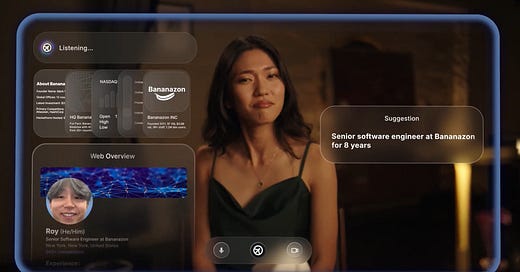Outsourcing Your Life to AI Will Make You Miserable
In an era of digital shortcuts and artificial ease, the most radical thing you can do is earn your way.
There’s a new artificial intelligence app called Cluely. It promises to help users “rewrite the balance of effort and outcome” and “cheat on everything,” from sales calls to exams to meetings and even relationships.
The app’s founder, Roy Lee, was himself kicked out of college for cheating, and is proud of it—”Kicked out of Columbia, Rescinded from Harvard” is featured prominently in his bio.
And it seems Lee is merely the canary in the coal mine. Over the last few months, there’s been an astonishing rise in reports of AI-enabled cheating on campuses all over the country. It’s not just students, either. Professors are beginning to use AI to grade papers. This means there have undoubtedly been occurrences where a professor’s bot is grading a student’s bot—machines talking to machines. An interesting conception of “education” and “higher learning.”
What follows isn’t a luddite diatribe. Artificial intelligence is a powerful technology with potential for great benefit. But we’ve also got to be mindful of the harms, and not just massive ones—such as bioweapons, propaganda, deepfakes, and the bots taking over—but also more subtle and insidious harms, perhaps especially those being heralded as benefits: such as the ability to cheat on everything.
A world in which we cheat on everything would be an awful one to live in
Consider a simple fact of life: growth, meaning, connection, confidence, excellence, satisfaction, and love—all the qualities we yearn for— do not come from dodging the difficult. They come from doing the thing, even, and perhaps especially, when it’s hard. Awkward conversations, calluses, failures, and vulnerable moments included.
Anyone can helicopter to the top of a mountain, but you don’t get to say you climbed it. Bragging rights aside, you miss out on the satisfaction and fulfillment that come from the messy ascent. In many of life’s most meaningful endeavors, the journey—the work—is the real reward.
The idea of using apps to cheat on everything reminds me of the movie Wall-E, the imagined future where our thinking (and doing) is automated for us.
But it’s important to note that Wall-E is not a utopia. It is a dystopia.
What becomes of life—of what it means to be human—if everything is handed to us at the click of a button?
The answer involves flatness, emptiness, and longing.
And we’re not too far off.
We live in a time of technological marvels. We can generate a poem, render a painting, compose a song, or simulate a conversation. We can even mimic falling in love and have sex with a robot. But when none of it requires effort, attention, presence, or vulnerability, when none of it costs us anything, what is it really worth?
There’s a quiet dignity in earning your way through something
A song you write after days of creative block. A relationship that deepens through shared struggle. A skill you build one repetition, one mistake, one correction at a time. These projects make life worthwhile. They shape your character.
Again: it’s not to say that we should shun new AI tools. They can be wildly helpful! I occasionally use them myself. But it’s crucial to regularly ask ourselves: Are we using these tools, or are they using us? Are they serving our humanity or replacing it?
The main reason I write and lift weights is because a technology company can’t design a robot that can make me feel what I feel when I write and lift weights. Maybe the robot can write more elegantly or lift something heavier. But it can’t make me feel the aliveness of a great idea. It can’t make me feel the rhythm of a great sentence. It can’t make me feel the heavy-ass bar starting to move. This feeling is what makes us human. Resist the temptation to trade the hard, gritty, and beautiful work of being human for the illusion of ease.
Protecting What Makes Us Human
The ability to discern what, when, how, and why to use new technologies is becoming a key skill—perhaps the foremost skill—to living a rich and textured life in modern times.
There are things to outsource to technology. There are things to keep sacred and protect. What this balance looks like will differ from person to person. Challenge yourself to maintain an awareness of when and to what extent you use tools that make things easier, versus when you want to lean in and go through the struggle yourself.
Also remember that just because something is easier, doesn’t mean it’s better. AI writing is a prime example. At first, it’s pithy and shockingly good. But then you read a few more sentences and realize it’s empty, vapid, and circular. (It’s also true that much of modern culture is empty, vapid, and circular. But who wants to live a flattened and commoditized life?)
What do I have to gain from using AI and what do I have to lose? Not all effort is meaningful. But there is rarely meaning without effort. Keep this in mind for everything you do. It’s how you fight for your humanity. It’s how you protect the experiences that make life worth living.






Hit the nail on the head. The Move Fast Break Things cult will never realise this. Pity them all.
HARD agree 💯. Beautifully articulated defense of effort and struggle, agency and autonomy, Brad. Ours is a culture that increasingly valorizes short-cuts, hacks, and unearned glory that is merely a simulacra, a wafer thin veneer of achievement that crumbles upon the slightest examination or scrutiny.